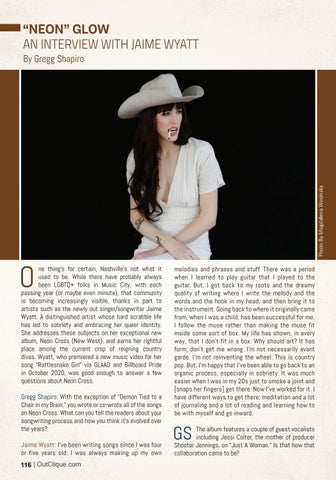“NEON” GLOW AN INTERVIEW WITH JAIME WYATT
Photo By Magdalena Wosinska
By Gregg Shapiro
O
ne thing’s for certain, Nashville’s not what it used to be. While there have probably always been LGBTQ+ folks in Music City, with each passing year (or maybe even minute), that community is becoming increasingly visible, thanks in part to artists such as the newly out singer/songwriter Jaime Wyatt. A distinguished artist whose hard scrabble life has led to sobriety and embracing her queer identity. She addresses these subjects on her exceptional new album, Neon Cross (New West), and earns her rightful place among the current crop of reigning country divas. Wyatt, who premiered a new music video for her song “Rattlesnake Girl” via GLAAD and Billboard Pride in October 2020, was good enough to answer a few questions about Neon Cross. Gregg Shapiro: With the exception of “Demon Tied to a Chair in my Brain,” you wrote or co-wrote all of the songs on Neon Cross. What can you tell the readers about your songwriting process and how you think it’s evolved over the years? Jaime Wyatt: I’ve been writing songs since I was four or five years old. I was always making up my own
116 | OutClique.com
melodies and phrases and stuff. There was a period when I learned to play guitar that I played to the guitar. But, I got back to my roots and the dreamy quality of writing where I write the melody and the words and the hook in my head, and then bring it to the instrument. Going back to where it originally came from, when I was a child, has been successful for me. I follow the muse rather than making the muse fit inside some sort of box. My life has shown, in every way, that I don’t fit in a box. Why should art? It has form; don’t get me wrong. I’m not necessarily avant garde. I’m not reinventing the wheel. This is country pop. But, I’m happy that I’ve been able to go back to an organic process, especially in sobriety. It was much easier when I was in my 20s just to smoke a joint and [snaps her fingers] get there. Now I’ve worked for it. I have different ways to get there; meditation and a lot of journaling and a lot of reading and learning how to be with myself and go inward.
GS
The album features a couple of guest vocalists including Jessi Colter, the mother of producer Shooter Jennings, on “Just A Woman.” Is that how that collaboration came to be?
















